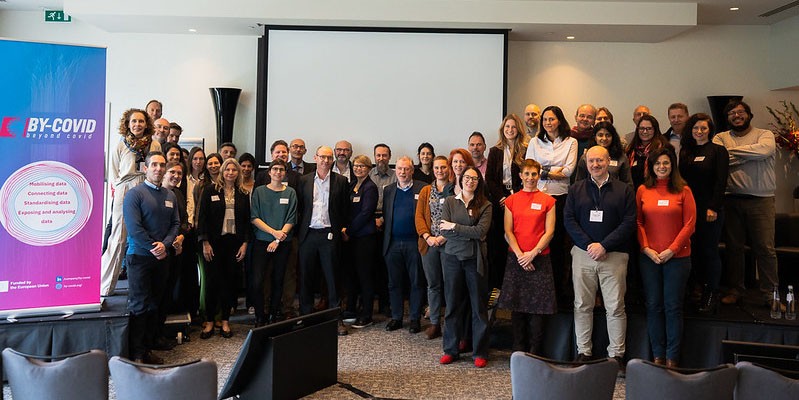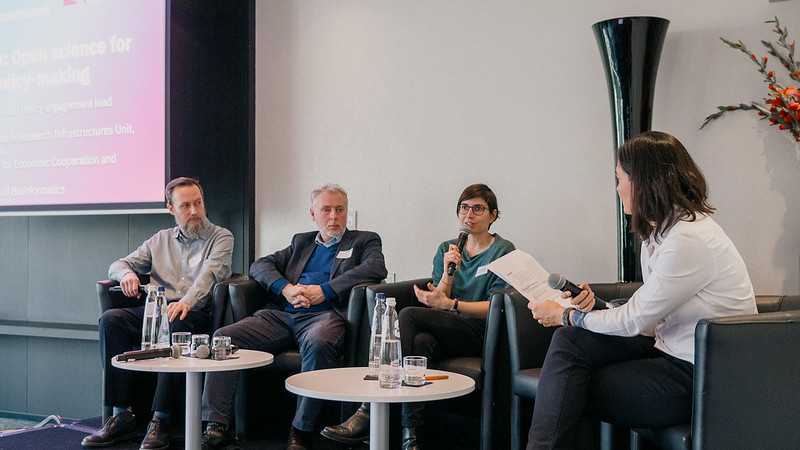Open science for pandemic preparedness - accelerating research, innovation and policy-making
19 January 2024

The BY-COVID project gathered together key opinion leaders in Brussels at the end of 2023 to discuss different perspectives on using open science to advance pandemic preparedness.
The one-day meeting focused on open science in research, industry and innovation, and policy-making and was attended by BY-COVID project partners and representatives from academia, industry and policy fields. Key takeaways are summarised below.
The impact of open science from four different perspectives
Policy-making
Corinne Martin, BY-COVID policy engagement lead, ELIXIR moderated a panel discussion on “Open science for effective policy-making.”
Frederic Sgard [slides], from the OECD Global Science Forum, spoke about open science in the context of research infrastructures. He emphasised the importance of research infrastructures in providing scientific support to public policy making and addressing complex multidisciplinary challenges. Challenges include ensuring data access for broad user communities, balancing open access with security, and providing trustworthy and digestible data for non-experts. A key recommendation was to enhance networks between different research infrastructures.
Aitana Neves [slides], from the Swiss Institute of Bioinformatics (SIB), described enabling open science through a global network of pathogen data platforms that are FAIR+E (Findable, Accessible, Interoperable and Reusable within an Equitable ecosystem). The advantages of coordinated data brokering at the national level were highlighted, which include single entry points for data providers, expert data curation, ensuring common standards and bioinformatics pipelines, and a shared ethical and legal framework. Aitana spoke about the creation of a European community of practice to foster knowledge exchange, capacity building and common standards, and shared her vision beyond COVID-19 and Europe.
Kostas Repanas, Open Science & Research Infrastructure Unit, Directorate-General for Research and Innovation (DG RTD), European Commission (EC) covered his points in his keynote described below [slides].
The panel discussed the role the public data infrastructure played during the COVID-19 pandemic, what was learnt about fostering open data sharing to support decision-making, and recommendations for future pandemic preparedness. Key takeaways included collaborating internationally to break down national silos, incentivising data sharing, ensuring watertight data protection, and ensuring sufficient context is available to make data useful in policymaking. Research infrastructures were particularly praised for their agility and swift responses during the pandemic.
Industry and innovation
Despoina Sousoni, BY-COVID industry engagement lead at ELIXIR chaired the session on “Open science for innovation and industry”.
Katharina Lauer [slides], Director for Data Partnerships and Strategy at Airfinity, spoke about the company’s predictive analytics services which use a combination of open and proprietary scientific and socioeconomic data. She described Airfinity’s approach to tracking, predicting and simulating population-level disease outcomes in real-time, which enables the identification and modelling of market opportunities. Katharina emphasised that data are only actionable when standardised and well described, and highlighted the role played by research infrastructures in driving standardisation and building a skill base in data management.
Ruben Soares [slides], Chief Scientific Officer at APLEX Bio, described the development of Hyperplex PCR, a cutting-edge molecular analysis technology offering high multiplexing capabilities without compromising sensitivity or specificity. Hyperplex PCR’s speed and precision gives advantages in an outbreak situation where rapid molecular diagnosis is critical, and its affordability enables widespread use in global surveillance. The technology is currently monitoring 18 wastewater targets in Sweden, on behalf of the Swedish Environmental Epidemiology Center, with data shared in Uppsala University’s Pathogens.se portal.
Research
Elaine Harrison, BY-COVID communications strategy lead at ELIXIR, set the final panel the challenge of answering critics who say that open science is idealistic and unrealistic in practice. Each of the three panellists gave a five-minute pitch and then the topic was opened for discussion.
Phil Gribbon [slides], Head of Discovery Research at the Fraunhofer Institute of Translational Medicine and Pharmacology introduced his pitch with a quote, attributed to the philosopher George Santayana, “Those who cannot remember the past are condemned to repeat it". He suggested that if science isn’t fully open, then opportunities for learning are lost and resources wasted on repeating experiments. The point was illustrated with the mass of clinical trials on repurposing drugs for Covid, which could not all be compared due to missing data.
Guy Cochrane, Head of the European Nucleotide Archive at EMBL-EBI, emphasised that “science has been forever built on science”. He gave the example of how the open availability of thousands of coronavirus sequences at the beginning of pandemic accelerated understanding the biology and evolution of SARS-CoV-2 virus. Data reuse tends to happen in ways that cannot be predicted at the time of deposition, requiring that funders maintain a long term vision and act with the wellbeing of future generations in mind.
Jonathan Ewbank, Director General of European Research Infrastructure on Highly Pathogenic Agents (ERINHA), highlighted the importance of culture within the academic environment. He gave examples of how research culture, even in very similar labs, can lead to norms of either data sharing or data hoarding which become difficult to challenge. Cost benefit analysis is important, for example, the benefit of sharing massive image datasets must be balanced against the associated data storage costs.
At the end of the discussion, the speakers were offered a final reflection. Phil Gribbon highlighted the importance of tackling the additional challenges of making clinical data, compared to basic science data, open and available. Jonathan Ewbank emphasised the promotion of culture change through recognition and attribution, and Guy Cochrane reminded the audience how the pandemic showed that the knowledge that flows from open data can change the world.
Insights from funders and policy makers
The day included keynotes from the European EC’s Directorate-General for Research and Innovation (Kostas Repanas [slides], Open Science & Research Infrastructure Unit and Katja Neubauer [slides], Pandemic Preparedness Partnership), and Wolfgang Phillip, from Health Emergency Preparedness Authority (HERA).
The EC speakers addressed the European Union’s (EU) comprehensive approach to pandemic preparedness and response. The ERAvsCorona Action Plan and subsequent research actions were highlighted, including emergency calls for research funding, the setup of large-scale cohort and clinical trial networks, innovative health-related approaches and the enhancement of research infrastructures. The European COVID-19 Data Platform was highlighted as an exemplar open science initiative, playing a crucial role in data sharing and pandemic preparedness. Additionally, the development of strategic research areas like BE READY and integrated services for infectious disease outbreak research (ISIDORe) were discussed, underscoring the EU's commitment to a coordinated, open, and data-driven approach to tackling health emergencies.
Wolfgang Phillip gave an overview of the role of HERA in pandemic preparedness and response. Key areas included intelligence gathering, research and development, medical countermeasures production, procurement, distribution and stockpiling. The presentation also highlighted HERA's involvement in global health security, addressing supply chain bottlenecks and building capacities in low- and middle-income countries. To support these goals, HERA has been awarded 19 million Euros for an Advanced Technology for Health INtelligence and Action IT System (ATHINA).

Summary and next steps
The gathering demonstrated the collaborative spirit and forward-thinking approach that is essential for advancing pandemic preparedness. By bringing together leaders with a range of perspectives, showcasing the latest developments, and facing challenges head-on, the day set the stage for enhancing global health security with a shared commitment towards a more resilient and responsive health system, in Europe and beyond.
The BY-COVID project is now in its final year. Discussions from the meeting will contribute to a closing policy brief in September 2024.
Find out more